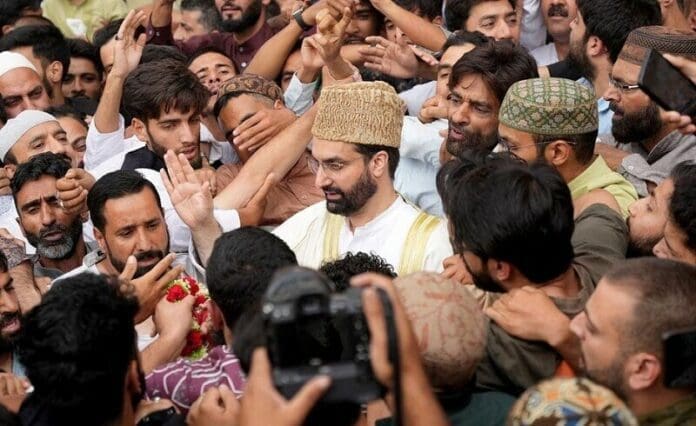The Indian government has finally released Mirwaiz Umar Farooq, the prominent Kashmiri chief cleric and Hurriyat leader, after more than four years of house arrest. This move comes after the government revoked Jammu and Kashmir’s constitutional semi-autonomy and imposed federal rule back in 2019, leading to the detention of Farooq and numerous other political leaders and residents.
During this period, an internet shutdown was imposed, and India strengthened its armed forces in the region to suppress protests. While most detainees were eventually released, Farooq remained confined to his residence near the Jamia Masjid mosque in Srinagar.
On Friday, thousands of worshippers eagerly gathered to witness Farooq lead Friday prayers for the first time in 218 weeks. The atmosphere was filled with joy as women showered him with sweets, and religious slogans echoed through the historic 14th-century mosque.
Last week, a court demanded an explanation for Farooq’s continued detention. To the delight of the crowd, he announced that the police had informed him about his impending release the day before.
Moved by the occasion, Farooq emotionally expressed, “This period of my house arrest and separation from my people has been the most painful for me since my father’s death.” His sentiment resonated with the worshippers, many of whom have looked to him for guidance and leadership.
The Jamia Masjid mosque has always been a hotbed of separatist politics and anti-India protests. Farooq wasted no time in expressing his stance against the constitutional changes made by Prime Minister Narendra Modi’s Hindu nationalist government, deeming them “unacceptable.” He also highlighted the importance of resolving disputes through dialogue rather than resorting to power or unilateral actions, citing Modi’s stance on Ukraine.
The region of Jammu and Kashmir is disputed territory, with both India and Pakistan claiming it in its entirety. The conflict has resulted in two wars and a violent insurgency since 1989, resulting in the deaths of thousands of people, including civilians, militants, and Indian troops.
Enhanced security measures, including counter-insurgency police and commandos, were implemented around the mosque to ensure a peaceful gathering during Farooq’s release.
Regular worshipper Bashir Ahmed expressed his joy by saying, “Our beloved and our king of hope has returned to this mosque after so long. How can I not be weeping with joy?”
Since the imposition of direct rule, media freedoms and public protests have been curtailed. The government’s efforts to bring peace and prosperity to the region have also sparked controversy, allowing Indians from other regions to purchase land and secure government jobs, which critics label as “settler colonialism.”
While there has been a significant reduction in armed clashes between Indian soldiers and freedom fighters seeking independence or merger with Pakistan, the recent month saw an increase in violence, resulting in the deaths of at least 14 individuals, including eight security personnel.
